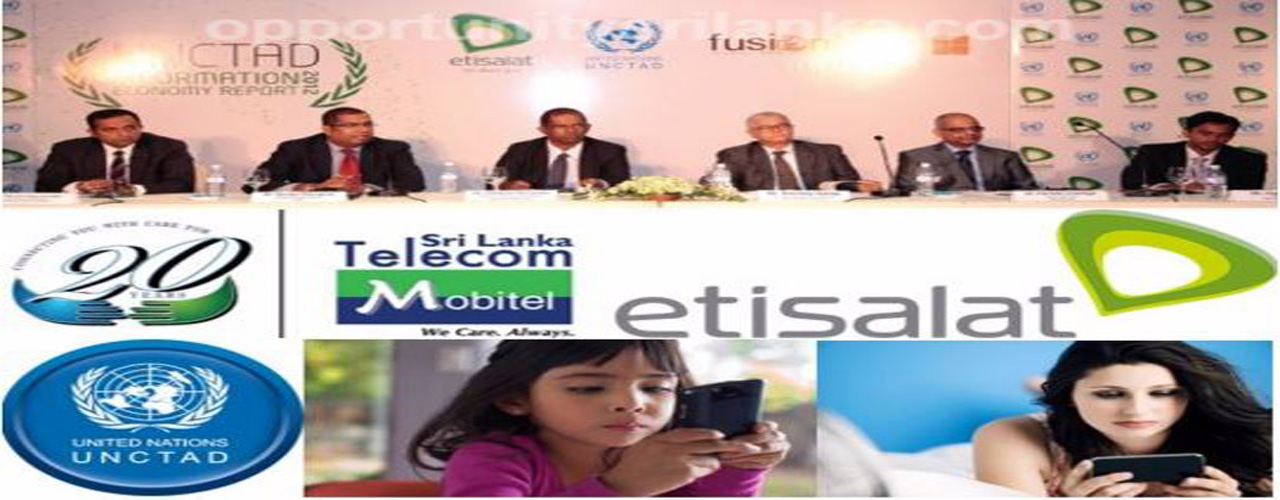Mobitel wants to buy Etisalat
• Aimed to bridge the digital divide in Sri Lanka, with special focus laid on education, improving efficiencies in the business sector and encouraging fruitful public-private partnerships, Mobitel is in the process of expanding its network to add 1,800 new base stations islandwide, increasing the current number from 3,500 – aiming for 100% population coverage.
• Recognized by the Institute of Engineers Sri Lanka (IESL) for the 3rd consecutive year for engineering services, Mobitel was bestowed with the ‘Engineering Excellence Award 2014’ for the completion of Stage VII project. (The largest network expansion project which consists of more than 1530 2G/3G/LTE nodes, 700 Transmission nodes and more than 430 infrastructural elements).
• Mobitel was awarded with the prestigious ISO 27001:2005 certification for the company’s solid and reliable Information Security Management System (ISMS) for securing information within the organization and ensuring safety and reliability to customers.
• With an overall investment of over US$ 500mn to date, Mobitel strives to uplift lives, create new opportunities and develop Sri Lanka’s ICT landscape living by its credo of “We Care. Always.”
Sri Lanka’s Mobitel intends to explore acquisition of Etisalat, after the Cabinet Committee on Economic Matters said it could carry out a due diligence prior to negotiations between the mobile companies, a media report said.
A Committee is already looking into the proposed acquisition of Hutch, the 4th mobile phone operator in Sri Lanka.
The ministerial committee noted that growth potential of Mobitel has been hampered due to spectrum constraints and pointed out that it requires additional spectrum.
OSL Take:
Commencing operations in 1993, Mobitel was one of the foremost mobile service providers in Sri Lanka, beginning operations using first generation cellular technology – Advanced Mobile Phone System (AMPS)/ Time division multiple access (TDMA).
In October 2002, Mobitel became a fully-owned subsidiary of Sri Lanka Telecom. In the following years Mobitel grew from strength to strength, launching its fully-fledged EDGE/GPRS enabled 2.5G GSM network, which is designed to operate on dual band in 2004.
Mobitel again established its dominance of the mobile communication industry by being one of the first ten mobile service providers in the world to launch a 3.5G HSPA network in 2007.
Mobitel was also the 1st service provider with a super 3.5G network in South Asia. Furthermore, Mobitel successfully demonstrated HSPA + MIMO technology with downlink speeds of up to 28.8 Mbps and carried out a successful trial of 4G/LTE technology with downlink speeds exceeding 96 Mbps, for the 1st time in the South Asian region.
In addition, Mobitel recently launched Dual Carrier HSPA+ technology and it is now equipped with the country’s first mobile 4G/LTE equipment.
Currently standing with a customer base of over 5 million Mobitel continued with its strategy positioned around value innovation and customer centricity, making the best out of the technology being used, distribution systems, product portfolio and value added services with heightened acumen focused on customer needs and interests.
The ministerial committee noted that growth potential of Mobitel has been hampered due to spectrum constraints and pointed out that it requires additional spectrum.
Sri Lanka is upgrading and building the “communications platform” to keep up with the regional fast-growers and mobile phone usage has basically transformed the way of life in the island.
From banks to politicians are using the “mobile” to connect with the population and potential overseas investors have many investment opportunities in the communications industry here in the island.
For a comprehensive industry analysis of the current mobile market, consult the biz-friendly OSL Team today.
Etisalat -Sri Lanka:
Etisalat acquired the Sri Lankan Operation of Millicom International Cellular (MIC), Tigo (Sri Lanka) on 16 October 2009. The acquisition was completed with a total enterprise value of $207 million, out of which $155 million was in cash.
Tigo (Sri Lanka) under the brand name CELLTEL started operations in June 1989 on a Motorola TACS system and was the first cellular operator in Sri Lanka as well as South Asia.
In January 2007, Millicom replaced the local CELLTEL brand with Tigo, their international brand. In February 2010, Tigo was rebranded as Etisalat.
Etisalat Lanka operates a GSM/EDGE supported network using 900 / 1800 MHz. The company on 5 May 2011 launched HSPA+ services over 2100 MHz, becoming the first LTE ready mobile network in the country.
Dual Carrier HSPA+ services was launched on 15 August 2012 by Etisalat Sri Lanka, the 1st operator in South Asia to do so.
Etisalat Lanka was recently mentioned in the UNCTAD Information Economy Report of 2012 for the Android Eco System it had been able to develop in Sri Lanka.
It was commended for its inclusive policy and several other innovations done in the market such as the AppZone (Sri Lanka’s first independent 3rd party app store and the Book Hub, Sri Lanka’s first eBook store) Many governments are now looking at this eco system and how it can be implemented in their respective countries.
| Article Code : | VBS/AT/04082016/Z-1 |

